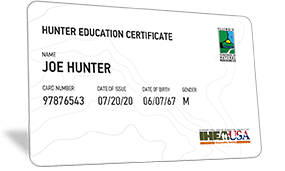
AGE REQUIREMENTS FOR ILLINOIS HUNTERS
All hunters who were born on or after January 1st, 1980 must obtain a Hunter Education Certification in order to be issued a hunting license. There is no minimum age to get certified.

ILLINOIS HUNTING EDUCATION REQUIREMENTS
WHAT IS AN ILLINOIS HUNTER EDUCATION CERTIFICATE
An Illinois Hunter Education Certificate proves that you’ve obtained the knowledge needed to hunt safely, responsibly, and ethically, within the state of Illinois. All hunters who were born on or after January 1st, 1980 are required to get certified in order to purchase a hunting license.
WHERE CAN I GET MY ILLINOIS HUNTER EDUCATION CERTIFICATE?
You can obtain your Illinois Hunter Education Certificate by completing an Illinois Department of Natural Resources-approved course. Courses can be taken either online or in-person, depending on your preference and age.
Instructor-led Class
Instructor-less courses are available to students who wish to complete their Hunter Education Certification in-person. Classroom courses typically take a minimum of 10 hours to complete and may take place over multiple days, or in a single session.
Online + Field Day
Students who are 17 years of age or less may choose to complete a portion of their hunter education certification online. Students within the age group will be required to complete an in-person field day course upon completing the online portion, in order to be issued their Hunter Education Certificate. Upon completion of the online portion, students who are 17 years of age or less will be issued a completion voucher which will grant them access to the field day portion of the course.
Online Only
Students who are 18 years of age or older may choose to obtain their Hunter Education Certificate entirely online. Online courses typically take 4-6 hours to complete, and students will be issued a Temporary Hunter Education Certificate upon completion.
HOW OLD DO I HAVE TO BE TO GET A HUNTER EDUCATION CERTIFICATE IN ILLINOIS?
There is no minimum age to complete a hunter education course in Illinois, and obtain a Hunter Education Certificate.
APPRENTICE HUNTING LICENSE
Apprentice licenses are available to hunters of all ages including residents and non-residents. This license type permits the holder to take game without hunter education certification as long as they are supervised.
If the apprentice license holder is taking game on private land they must be supervised by an adult who is 21 years of age or older. When hunting on public land, the apprentice license holder must be supervised by an adult who is 21 years of age or older who is licensed and is in compliance with hunter education certification requirements.
Is my Illinois Hunter Education Certificate valid in other states?
The Illinois Hunter Education Certificate will be accepted in any US state, province, or country which also requires mandatory hunter education, meaning hunters who have obtained their Illinois Hunter Education Certificate may use it to hunt in other states. This is known as “reciprocity”.
What's the difference between a Hunter Education Certificate and a Hunting License?
A Hunter Education Certificate proves that you’ve obtained the knowledge you need to hunt safely and ethically in Illinois, and is different from a Hunting License. The Hunting Licence is similar to a permit, and is required to hunt any game animal within the state. Different licenses and permits may be required depending on which game animal is being hunted.
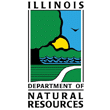
HUNTING LICENSES, STAMPS, AND PERMITS
HUNTING LICENSES
A Hunting License is required in the state of Illinois to hunt any game animal. There are a variety of license types available depending on your age, residency status, and what type of game you plan to hunt.
In addition to a hunting license, residents of Illinois are required to obtain a Firearm Owner’s Identification Card (FOID Card). The FOID card is required by any Illinois resident who possesses firearms, firearm ammunition, tasers or stun guns within the state. The FOID card must be in the holders possession at all times while hunting.
Some of the hunting license types in Illinois include:
Resident Hunting Licenses
There are a variety of resident hunting license types available within the state of Illinois. Some of the resident license types available include life-time licenses, sportsman licenses (which grant both hunting and fishing privileges), seniors license types, and veteran’s licenses.
Non-Resident Hunting Licenses
There are a variety of non-resident license types available, including annual license types, in addition to 5-day license types or preserve licenses. These license types are available to non-residents who wish to hunt within the state of Illinois.
Apprentice License
Apprentice licenses are available to hunters of all ages including residents and non-residents. This license type permits the holder to take game without hunter education certification as long as they are supervised.
If the apprentice license holder is taking game on private land they must be supervised by an adult who is 21 years of age or older. When hunting on public land, the apprentice license holder must be supervised by an adult who is 21 years of age or older who is licensed, and is in compliance with hunter education certification requirements.
Youth License
Youth hunting licenses are available to hunters who are less than 18 years of age. This license type permits the youth to take game within the state, without having obtained hunter education certification. Hunters who possess this license type must be supervised by an adult who is 21 years of age or older. The supervising hunter must be properly licensed and in compliance with hunter education requirements.
ILLINOIS HUNTER CERTIFICATION AGE REQUIREMENTS

UNDER 18 YEARS OF AGE
Hunters who are less than 18 years of age may choose to obtain a Youth License. This license type permits the youth to take game within the state, without having obtained hunter education certification. Hunters who possess this license type must be supervised by an adult who is 21 years of age or older. The supervising hunter must be properly licensed and in compliance with hunter education requirements.

Born on or after January 1st, 1980
Hunters who were born on or after January 1st, 1980 are required to obtain hunter education certification order to purchase a hunting license, unless they possess a youth hunting license or apprentice hunting license, and meet the supervision requirements.

Illinois's Hunting Fines

Hunting License and Permit Violations
Up to $1500

Hunter Orange Violations
Up to $1500

Unlawful taking of wildlife (depending on game animal)
Up to $1500

Possession of protected species
Up to $25,000

Possession of game animal during closed season
Up to $2500
ILLINOIS HUNTING FAQS
DO I NEED A HUNTING LICENSE TO HUNT WITHIN THE STATE OF ILLINOIS?
Yes. A Hunting License is different from a Hunter Education Certificate and is required for any person who hunts any game animal within the state. This includes both residents and non-residents. Varying licenses must be purchased and carried depending on the hunter’s age, residency, and the type of game being hunted. Certain exceptions may apply depending on the game animal being hunted. For more information on Illinois, hunting licenses visit the Illinois Department of Natural Resources website.
WHAT ARE THE ILLINOIS TAGGING REQUIREMENTS?
Certain game animals must be tagged and checked or reported after they’re taken, including big game animals such as deer. It’s important for hunters to understand the tagging and/or harvest reporting requirements for the game animal they’re hunting, and to ensure that the animal is tagged and reported properly.
Mandatory Harvest Reporting Requirements
All deer that are harvested within the state of Illinois during the muzzleloader, archery, or late winter antlerless seasons, in addition to deer harvested during special CWD seasons, and during the firearm season in counties without CWD surveillance, must be registered.
The harvest must be registered by 10 pm on the same calendar day that the deer was taken. Deer harvests can be reported by using the telephone check-in system by calling 1-866-452-4325, or online by visiting dnr.illinois.gov/hunting/
In counties that have CWD surveillance, harvested deer must be physically registered at designated check stations. Upon registering the harvest, the hunter will be issued a permanent leg tag and harvest confirmation number which must be written on the tag. The harvested deer must remain whole (field dressed) until it has been checked.
For more information on tagging and harvest reporting requirements, visit the Illinois Department of Natural Resources website.
WHAT ARE THE HUNTER ORANGE REQUIREMENTS IN ILLINOIS?
Under certain conditions, hunters within the state of illinois will be required to wear a solid blaze-orange or blaze-pink cap, in addition to an outer garment which displays at least 400 square inch of solid blaze-orange or blaze-pink material. Camouflage orange or pink will not meet these requirements.
Hunters are required to meet hunter orange requirements:
- To hunt deer during any firearms deer season
- To track a wounded deer with a dog during any firearms deer season
- To accompany any youth during any firearms deer hunt
- Hunt turkey with archery equipment during a firearms season
Additionally, hunters who are hunting from a ground blind during any firearms deer season must ensure that the blind has at least 400 inches of solid hunter-orange or pink is securely attached to the uppermost portion of the blind, and is visible for 360 degrees.
WHAT ARE THE BAG LIMITS IN ILLINOIS?
Bag limits are imposed on hunters to restrict the number of a particular game animal that can be taken. Bag limits may be daily or seasonal depending on the type of animal. Daily bag limits may be imposed which restrict the number of a particular game animal that may be taken within one hunting day, whereas seasonal bag limits restrict the number of a particular game animal that may be taken by a hunter within the hunting season.
Bag limits may vary annually depending on game species populations. Hunters must understand and follow bag limit restrictions. Violations may result in fines. For more information on bag limits visit the Illinois DNR website.

GAME AND NON-GAME SPECIES
GAME SPECIES
Illinois offers a wide variety of game species for all types of hunters. The state’s landscape offers a wide range of habitats and ecosystems for wildlife, including game species. Some of the game species in Illinois include:
- Big game including deer and turkey.
- Small game including woodcock, pheasant, and quail, among others.
- Waterfowl and other migratory game birds including ducks, geese, and dove.
- Furbearers including otter, badger, bobcat, beaver, fox and coyote.
NON-GAME SPECIES
Nongame species within Illinois make-up a majority of the state’s wildlife and include mammals, birds, fish, reptiles, amphibians, and invertebrates which typically may not be hunted, are considered a nuisance, or are protected, endangered, or at risk. There is, unfortunately, a lengthy list of endangered, protected, and threatened species within the state. For more information on nongame, and endangered species within the state visit the Illinois DNR website.
INVASIVE SPECIES
Invasive animals and other pests have been introduced to the United States, including the State of Illinois, and have become a threat to native wildlife. These animals, plants, fish, and invertebrates typically have no natural predators which can result in the rapid spread and population growth. This in turn can seriously harm the state’s lands and waters and can be detrimental to the health and population numbers of a variety of the state’s native plants and animals. Some common invasive species in Illinois include brown rat, European starling, chinook salmon, Asian clam, and emerald ash borer.
In order to protect Illinois native plants and animals, invasive species must be controlled and eradicated. Anyone who encounters or suspects that they have encountered an invasive species within the state is encouraged to report the sighting so that it can be monitored and controlled. For information on how to report various types of invasive species in Illinois visit the Illinois DNR website.

ILLINOIS HUNTING SEASONS
Hunting seasons and dates may change annually per game animal, depending on a variety of factors. Season dates are further broken out, region or zone. Additionally, seasons are often categorized by firearm time, including archery, firearms, and muzzleloader or “primitive” firearms seasons.
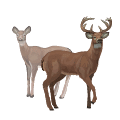
Deer
Deer seasons in Illinois are organized by region or county, firearm types, and the type of deer (antlered, antlerless, and special CWD zones). The deer season typically opens in October with the archery season, with later seasons closing as late as January of the following year.
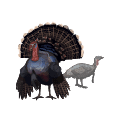
Turkey
Turkey season in Illinois includes spring, fall, and youth seasons. Seasons dates may vary depending on the region in which you’re hunting. The spring season is typically held in April, with later dates closing mid-may, for both shotguns and archery. The fall archery season opens in October and closes in January, whereas the shotgun season opens in October and closes in November.
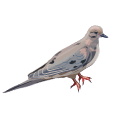
Dove
Dove season is held state-wide in Illinois and includes both mourning and white-winged dove. The season typically opens on the 1st of September and closes as late as January of the following year. Both daily bag limits and possession limits apply.

Upland Game
Seasons dates for upland game animals will vary depending on the species – and there are several upland game species available to hunt within the state including pheasants, quail, partridge, rabbit, and woodcock, among others. Seasons for upland game animals begin as early as the first of September, with later seasons closing as late as February of the following calendar year.
HUNTING ON PUBLIC OR PRIVATE LAND
PRIVATE LAND
Much of the land in Illinois is privately owned. Hunters can typically freely take game animals hunted on their own private property or may seek permission from a landowner to hunt on private property. Hunters who wish to take game on privately owned land must follow state hunting regulations as well as any regulations specified by the landowner. Hunters must ensure they respect the rights and property of the landowner at all times.
PUBLIC LAND
There are hundreds of thousands of acres of public land space open to hunting within the state of Illinois including Wildlife Management Areas (WMAs), state and national forests, wildlife areas, and refuges. These lands are managed by the Illinois DNR, and other state agencies for land, habitat, and wildlife conservation and management purposes.
State managed lands may have specific rules and regulations in place that must be followed by all land users. State lands may also be used for other recreational purposes including hiking, fishing, biking, and wildlife watching. For more information on the rules and regulations that apply to hunters and other recreational users of state lands, visit the Illinois DNR website.
WILDLIFE MANAGEMENT AREAS
Hunting in Illinois Wildlife Management Areas
Although much of Illinois land is privately owned, the Illinois Department of Natural Resources leases, owns, and/or manages more than 200 public land spaces throughout the state, including Wildlife Management Areas. These lands encompass diverse habitats and a wide variety of wildlife and game species for hunting.
WMA Regulations
Additional rules, regulations, and restrictions may apply when hunting in Wildlife Management Areas, or using them for other recreational purposes. Regulations will typically be posted within the area and may vary depending on the Wildlife Area you’re accessing. Some of these regulations may include:
WMA Regulations
- Camping restrictions
- Baiting restrictions
- Dog training regulations for the purpose of hunting
- Restrictions on the use of fireworks
- Firearm type restrictions
- Recreational vehicle use restriction
WMA Permits
There are no specific additional permits required to hunt within Illinois state WMAs or Fish and Wildlife areas, however, all other regularly required licenses and permits must be obtained to hunt within any public area in the state.
The Prarie State. Ready and rarin’ to go.

Where to Hunt in Illinois
While the state of Illinois is home to a wide variety of game animals, it’s a particularly popular destination if you’re in search of upland game, waterfowl, or deer. Finding the perfect spot to flush out your prey will depend on what you plan to hunt.
Upland game hunters won’t have to look far to find a prime hunting location. The state is flush with a variety of upland game species and they can be found nearly state-wide however, popular destinations for upland game hunters include regions within east-central Illinois which boasts dense pheasant populations in particular. Public hunting areas within the region include the Middle Fork State Fish and Wildlife Area and Kickapoo State Recreation Area.
Waterfowl hunters should head slightly further west, where swampier regions combined with the Illinois river result in higher waterfowl populations. A top public hunting spot for waterfowl hunters can be found at the Sanganois State Fish and Wildlife Area.
If you prefer a less flighty game species, deer hunting is another of Illinois’ popular hunting opportunities. Make your way towards the state’s western border along the Mississippi where you’ll find healthy deer populations and the Mississippi River State Fish and Wildlife Area.